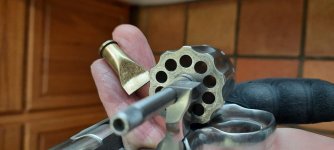Jalopiejoe
Member
- Joined
- Jun 7, 2013
- Messages
- 181
- Reaction score
- 137
Looking for your experience or thoughts on this!
I wanted to clean the carbon from the cylinder face, top strap and around the forcing cone area.
I took a .38 casing and flattened the opening and just lightly rub the cylinder and it removes most of powder ring and carbon.
It seems non-abrasive, do you think this would be harmful to the gun?
I don't want to scratch or remove metal!
Thanks!
I wanted to clean the carbon from the cylinder face, top strap and around the forcing cone area.
I took a .38 casing and flattened the opening and just lightly rub the cylinder and it removes most of powder ring and carbon.
It seems non-abrasive, do you think this would be harmful to the gun?
I don't want to scratch or remove metal!
Thanks!
Attachments
Last edited:


